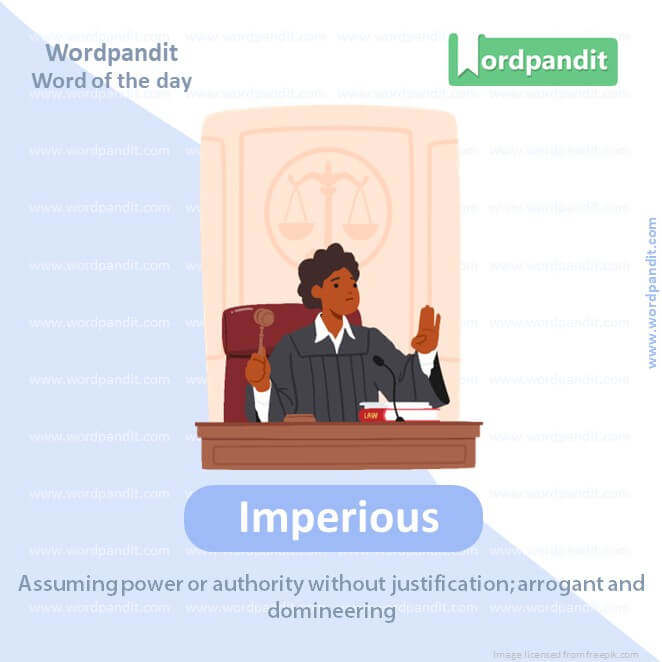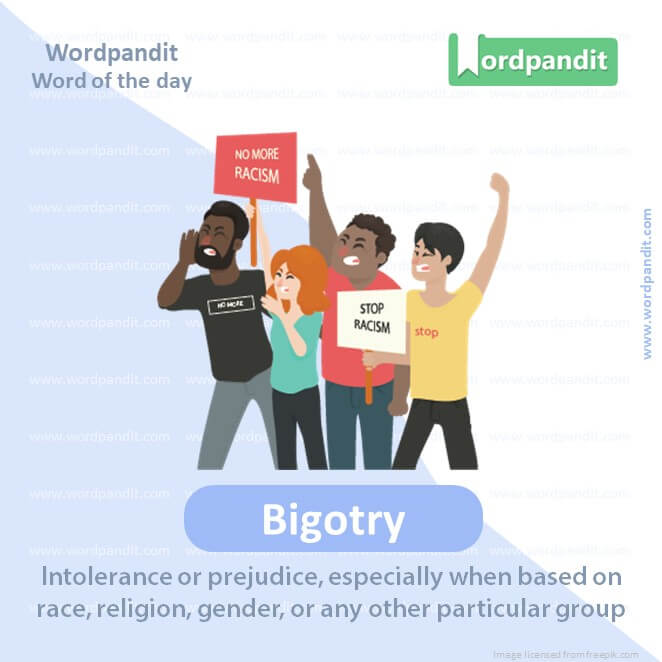Daily Vocabulary Words: List of Daily Used Words in Leading International Newspapers
Hi there. Welcome to this special section @ Wordpandit.
Our endeavour here is very simple: to highlight important daily vocabulary words, which you would come across in leading newspapers in the country. We have included the following newspapers in our selection:
• The New York Times
• The Washington Post
• Scientific American
• BBC
• The Guardian
• Psychology Today
• Wall Street Journal
• The Economist
We are putting in extensive work for developing your vocabulary. All you have got to do is be regular with this section and check out this post on a daily basis. This is your repository of words that are commonly used and essentially, we are posting a list of daily used words. Hence, this has significant practical application as it teaches you words that are used commonly in leading publications mentioned above.
Visit the website daily to learn words from leading international newspapers.
WORD-1: REPUDIATE
CONTEXT: The government was quick to repudiate the rumors of a proposed merger between the two biggest telecom companies.
SOURCE: The New York Times
EXPLANATORY PARAGRAPH: Repudiate is a big word that grown-ups use when they really, really don’t agree with something or don’t want something anymore. So, let’s say you love cookies but one day, just decide you don’t want them anymore. You would then repudiate, or say no to cookies from now on.
MEANING: Refusing to accept or be associated with any longer (verb).
PRONUNCIATION: Re-pyoo-dee-ayt
SYNONYMS: Reject, Disavow, Abandon, Renounce, Deny, Disclaim.
USAGE EXAMPLE:
1. I repudiate your statement and stand by my argument.
2. Tom decided to repudiate his old bad habits.
3. He could not repudiate the responsibility for his actions.
4. The company repudiated claims of any wrongdoing.

WORD-2: INHOSPITABLE
CONTEXT: The harsh, inhospitable terrain of the polar regions has long stymied explorers, but recent technological advancements are beginning to reveal their secrets.
SOURCE: The Guardian
EXPLANATORY PARAGRAPH: Inhospitable is when a place is not really friendly or nice to be in. Imagine being at a birthday party where no one offers you cake or even talks to you; that’s what inhospitable feels like.
MEANING: Unfriendly and unwelcoming; harsh or difficult to live in (adjective).
PRONUNCIATION: In-hos-puh-tuh-buhl
SYNONYMS: Unwelcoming, Hostile, Unfriendly, Unfavorable, Harsh, Bleak.
USAGE EXAMPLE:
1. The weather conditions are inhospitable for outdoor activities.
2. The hotel staff was inhospitable to the guests.
3. I find his attitude totally inhospitable.
4. It’s an inhospitable region for any flora and fauna because of severe climatic conditions.
WORD-3: HANDIWORK
CONTEXT: The beautifully detailed frescoes are the handiwork of an unknown, yet masterful artist from the 16th century.
SOURCE: Al Jazeera
EXPLANATORY PARAGRAPH: Handiwork is something that has been made or done by someone. Like the rainbow drawing you made in art class last week, that’s your handiwork!
MEANING: Something that one has made or done by oneself (noun).
PRONUNCIATION: Han-dee-wurk
SYNONYMS: Craftsmanship, Workmanship, Creation, Product, Output, Artefact.
USAGE EXAMPLE:
1. The quilt, with its detailed stitching, was clearly her handiwork.
2. Every piece of furniture in his room was his own handiwork.
3. The pottery display showed the excellent handiwork of local artists.
4. The beautifully crafted ship model showed the handiwork of a skilled artisan.

WORD-4: FIDELITY
CONTEXT: Many financial institutions have been stressing the importance of fidelity in managing clients’ funds, prioritizing trust and reliability above all.
SOURCE: The Economist
EXPLANATORY PARAGRAPH: Fidelity is a fancy word that means being loyal or always true to something or someone. Like when you promise to be the best friend forever, that’s you showing fidelity.
MEANING: To capture or trap someone or something (noun).
PRONUNCIATION: Fih-del-uh-tee
SYNONYMS: Loyalty, Faithfulness, Devotion, Dependability, Trustworthiness, Steadfastness.
USAGE EXAMPLE:
1. She showed fidelity to her team, even when they were losing.
2. Fidelity in relationships is one of the pillars of trust.
3. They pledged fidelity to their country.
4. High fidelity sound systems reproduce sound with minimal distortion.
WORD-5: REBUTTAL
CONTEXT: In a pointed rebuttal to the critics, the author defended her theories with rigorous scientific evidence.
SOURCE: BBC
EXPLANATORY PARAGRAPH: A rebuttal is when you say ‘No, that’s not right’ because you think differently. Suppose your friend tells you that rabbits can fly, and you tell them that they are wrong because rabbits can’t fly. That’s a rebuttal.
MEANING: A counterargument or denial in a debate (noun).
PRONUNCIATION: Re-but-ul
SYNONYMS: Counter Argument, Refutation, Defense, Reply, Response, Retort.
USAGE EXAMPLE:
1. The lawyer came prepared with a strong rebuttal to the allegations.
2. Her rebuttal of the accusations was filled with logical reasoning.
3. He presented his rebuttal to the proposed plan.
4. She delivered a powerful rebuttal to the opponent’s claims.
WORD-6: RESPITE
CONTEXT: After a grueling election campaign, the newly elected president takes a brief respite to recharge before taking office.
SOURCE: The Washington Post
EXPLANATORY PARAGRAPH: Respite is like a mini vacation or taking a break from something difficult or tiring. If you’re tired of cleaning your room and decide to take a break for some time, you’re taking a respite.
MEANING: A short period of rest from something difficult (noun).
PRONUNCIATION: res-pit
SYNONYMS: Break, Pause, Interval, Relief, Breather, Rest.
USAGE EXAMPLE:
1. The weekend provided a much-needed respite from her work.
2. I need a moment of respite before continuing the task.
3. The park provides a respite from the hustle and bustle of the city.
4. The beach vacation was a respite for the family from their busy life.

WORD-7: IMPERIOUS
CONTEXT: The lead actor’s imperious performance took center stage in the hit Broadway production.
SOURCE: The Washington Post
EXPLANATORY PARAGRAPH: Imperious is an adjective used to describe a person who acts like a king or queen, and expects other people to do what they want. If someone is bossy and thinks everyone should do things their way, they’re being imperious.
MEANING: Assuming power or authority without justification; arrogant and domineering (adjective).
PRONUNCIATION: Im-peer-ee-us
SYNONYMS: Domineering, Autocratic, Dictatorial, Overbearing, Authoritative, Commanding.
USAGE EXAMPLE:
1. His imperious manner tends to put people off.
2. She gave him an imperious look and walked away.
3. The manager’s imperious demands made the staff unhappy.
4. Despite his imperious nature, he was a successful leader.
WORD-8: RED HERRING
CONTEXT: Critics argue that the mayor’s latest proposal is a red herring designed to divert attention from the true problems plaguing the city.
SOURCE: The New York Times
EXPLANATORY PARAGRAPH: A red herring is not really a fish of a different color. It’s a trick when you try to distract someone with something which is not important or not related. Like when you show your little brother a toy to make him forget about the candy he wants.
MEANING: Something, especially a clue, which is intentionally misleading or distracting (noun).
PRONUNCIATION: Red-her-ing
SYNONYMS: Distraction, Smoke Screen, Diversion, Misdirection, Decoy, False Trail.
USAGE EXAMPLE:
1. The detective realized that the missing wallet was just a red herring.
2. The argument was a red herring to divert attention from the main issue.
3. He dropped a red herring into the conversation and changed the topic.
4. The mystery novel was full of red herrings to keep readers guessing.

WORD-9: BIGOTRY
CONTEXT: Human rights groups continue to condemn the alarming rise in bigotry and discrimination in the region.
SOURCE: The Guardian
EXPLANATORY PARAGRAPH: Bigotry is when someone is not fair or kind to people who are different from them, maybe someone of a different color, or from a different place, or who likes different things. It’s not nice to be a bigot.
MEANING: Intolerance or prejudice, especially when based on race, religion, gender, or any other particular group (noun).
PRONUNCIATION: Big-uh-tree
SYNONYMS: Prejudice, Bias, Partiality, Intolerance, Narrow-mindedness, Discrimination.
USAGE EXAMPLE:
1. We should stand up against all forms of bigotry.
2. His comments were indicative of his deep-seated bigotry.
3. Bigotry has no place in our society.
4. The bigotry exposed in the leaked emails was shocking.

WORD-10: EXISTENTIAL
CONTEXT: The novel raises existential questions about the nature of life and the roles we choose to play in it.
SOURCE: The Economist
EXPLANATORY PARAGRAPH: Existential is a word adults use when they talk about things that have to do with existence, or simply being. Like when you wonder why you are you, or why dogs are dogs and not cats, you’re being a little bit existential.
MEANING: Relating to existence or the nature of human existence (adjective).
PRONUNCIATION: ex-uh-sten-shul
SYNONYMS: Empirical, Experiential, Observational, Pragmatic, Apperceptive, Life-related.
USAGE EXAMPLE:
1. He was experiencing an existential crisis.
2. The existential questions about life and death have been asked for centuries.
3. The philosopher proposed an existential theory of being.
4. The movie raises existential questions about the purpose of life.
vocabulary 10 words
Expanding your lexicon but don’t know where to start? There’s an efficient approach that may just be the solution you’ve been seeking: focusing on vocabulary 10 words at a time. This method is known for its simplicity and efficacy, giving learners manageable and meaningful chunks of new knowledge to digest.
Let us delve into how to adapt the ‘vocabulary 10 words’ approach to your language learning routine. This strategy is quite straightforward: instead of attempting to learn dozens of words all at once, break your learning down into smaller steps. Take sets of vocabulary 10 words at a time. This not only makes the process less daunting but also allows for more focus and better retention.
Make your ‘vocabulary 10 words’ as diverse as possible. In these sets, include nouns, verbs, adjectives, and adverbs from different contexts. Creating variety within your selected vocabulary 10 words guarantees exposure to a range of language nuances while promoting a balanced growth of your verbal arsenal.
Afterward, engage with your chosen ‘vocabulary 10 words’ in different ways. Use them in written sentences, practice their pronunciation, or play word games. Interacting with these words in various forms reinforces their meaning and usage, ensuring that they stick in your memory.
At the end of each week, review your vocabulary 10 words. Recollection is vital in language acquisition, and revisiting these words will help cement them in your mind. Make this a regular practice for long-term retention and recall.
In conclusion, the ‘vocabulary 10 words’ tactic is not just about learning new terms. It boasts a targeted, balanced, and powerful approach to broadening one’s vocabulary. Not to mention, it fosters a manageable and enjoyable routine for learners of any language. Adopt the ‘vocabulary 10 words’ method and witness a considerable difference in your language proficiency.











